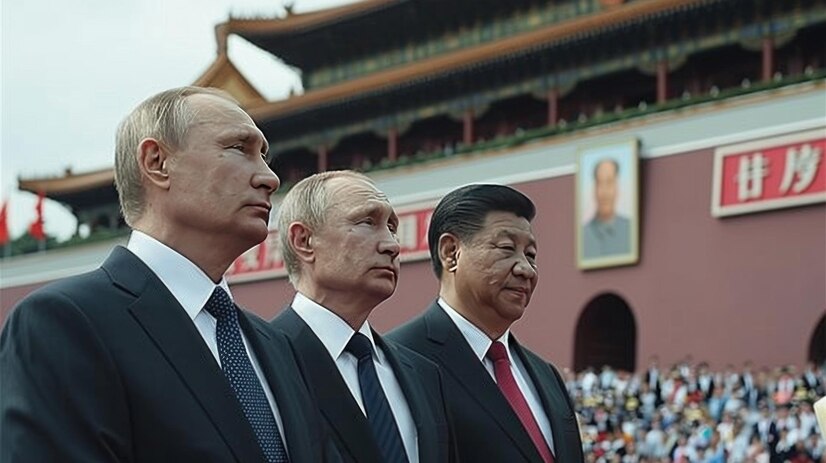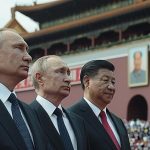The Middle East and North Africa are a “penetrated region” by two powers, the US and Russia, with China being a relative latecomer. China arrived during the end of the Cold War and the subsequent “unipolar moment.”
The thesis proposed that China and Russia’s efforts to counterbalance the United States were focused on “regional revisionism,” which refers to attempts to forcefully alter the regional political, territorial, and military status quo. These attempts had led to regional responses aimed at containing them, which involved strengthening the US-led alliance systems in Europe and East Asia. As a result, this reinforced US global hegemony. Therefore, the piece predicted a lengthy period of US hegemony, known as the “unipolar moment.” How has this argument fared over time?
China, Russia, and the Middle East have become key players in the global arena. As the unipolar moment of the United States begins to fade, these countries have been strategically positioning themselves to fill the power vacuum. But what are their motivations in the Middle East?
Firstly, let’s consider China. With its growing economy and increasing energy demands, China has a vested interest in the stability of the Middle East. The region is a major source of oil and gas, which China heavily relies on to fuel its economic growth. Beijing, in many respects, is a “great power lite” in the Middle East and the rest of the world, certainly outside of China’s own Asia-Pacific neighborhood. CCP leaders fear failure and are afraid of global overreach.
Since the outbreak of the ongoing conflict between Hamas and Israel, Beijing has issued a flurry of mostly right-sounding official pronouncements, calling for calm and urging all sides to exercise restraint because it has little, if anything, to gain materially from continued conflict and much to lose economically — notably a disruption of petroleum supplies and international shipping routes — if the crisis persists or escalates.
Additionally, China sees the Middle East as a crucial market for its goods and services. By establishing strong economic ties with countries in the region, China aims to secure its energy supply and expand its influence. However, Beijing is ill-postured to follow through with concrete actions for two reasons: an absence of real clout and an extreme aversion to risk. Moreover, China’s military is growing ever stronger, but they lack the ability to project military power and diplomatic muscle in the Middle East. Given the display of military power between America and China, we find a contradiction. The United States quickly sent two strike groups of aircraft carriers to the eastern Mediterranean, and in response, China temporarily sent six naval ships in the Gulf of Aden.
China’s naval presence is set to decrease by half due to a crisis coinciding with the transition between anti-piracy task forces. Despite the hype surrounding China’s aircraft carrier program, none of its commissioned carriers have ventured beyond the western Pacific, limiting its ability to project air or land power into the Middle East. While Beijing has expanded its global diplomatic engagement, its influence in the Middle East is primarily geared towards advancing economic interests and defending core interests. Although China has maintained amicable relations with various entities in the region, its diplomatic influence has been constrained. Beijing’s role in brokering the normalization of Saudi-Iranian relations, while notable, presented minimal risk, allowing China to capitalize on an opportunity with little potential downside.
China’s involvement in the Middle East during this period has reshaped the region’s landscape, as its expansion and investment extend beyond energy sources to include economic, geopolitical, and strategic considerations. However, China’s increasing involvement poses a threat to US interests in the region and its relations with its traditional allies.
While the Indo-Pacific region has become a focal and important point in the United States’ strategy in recent years, China has intervened as an important player in the Middle East. China has signed strategic partnerships and memorandums of understanding for its economic activities with most Middle Eastern countries, and China has established closer relations with various regional organizations. This was demonstrated by the fact that in 2022, China held its first China-Arab Summit and its first China-GCC Summit, demonstrating its commitment to strengthening strategic partnerships in the region and promoting economic development beyond its traditional energy interests. China’s increasing involvement in the Middle East is an important factor shaping the region’s geopolitical landscape and has major implications for global politics.
Economy and infrastructure
China has increased its trade with the region, and in 2020, bilateral trade replaced the European Union as the largest trading partner of the Gulf Cooperation Council countries. China also has the largest economic investment with Saudi Arabia and is the largest non-oil trading partner of the UAE globally. Additionally, China has a free trade agreement with members of the Gulf Cooperation Council, which is high on China’s diplomatic agenda.
In addition, Beijing has also expanded its investment projects in the Middle East through the maritime component of the Belt and Road Initiative (MSRI) due to China’s dependence on energy imports. In 2022, Middle Eastern countries expanded their cooperation with China and secured about 23% of Chinese participation in the Belt and Road Initiative, up from 16.5% the previous year. China has invested in the Red Sea Gateway Terminal — a joint venture between Chinese Shipping Ports COSCO and the Public Investment Fund of Saudi Arabia to develop and operate a container terminal at the Jeddah Islamic Port. Other projects include those in the TEDA area of the Suez Canal Authority and the operation of the new port terminal in Haifa Bay.
While Iraq is the largest recipient of financing for infrastructure projects in 2021, with approximately $10.5 billion in construction contracts, China has invested $10 billion in infrastructure projects in the Kurdistan region of northern Iraq. Furthermore, Iran and China have signed a “comprehensive strategic partnership” agreement worth $400 billion, which includes the joint development of ports. This development is particularly noteworthy considering that the port was previously under a long-term contract with India.
In contrast to their U.S. counterparts, China is insecure and unwilling to take risks when it comes to navigating the complexities of Middle East politics. This was evident during the recent Hamas attack on Israel, where Washington swiftly dispatched Secretary of State Antony Blinken and Secretary of Defense Lloyd Austin to the Middle East. Additionally, President Biden had initially planned to travel to Jordan and meet with three Arab leaders, but this in-person summit was canceled following the Al-Ahli hospital explosion. Mean while, China’s president remained in China, hosting Russian President Vladimir Putin at a Belt and Road forum and carefully avoiding any public mention of the Israel-Hamas conflict.
China’s envoy Zhai Jun has visited Qatar, Saudi Arabia, Jordan, Egypt, and the UAE as part of his Middle East shuttle diplomacy efforts. However, his focus has primarily been on defensively stabilizing Chinese bilateral relationships in the Arab world.
The impact of public opinion on China
Internal public opinion:
China manipulates public opinion in foreign policy and operates as a dictatorial state with a strong Communist Party. In addition to maintaining a powerful repressive apparatus and a sophisticated high-tech surveillance system, similar to Arab countries, the party controls the flow of information, dominates public messages, and exerts control over journalists. All messaging emphasizes that China has become a strong country thanks to the Chinese Communist Party.
Arab public opinion:
Beijing has also influenced leaders and public opinion in the Arab world. Chinese officials and media outlets publish messages that implicitly or explicitly criticize Israel and the United States, positioning the Chinese Communist Party as a friend of the Arab people.
Global public opinion:
Beijing aspires to play a global role and present a more appealing alternative to the United States. It focuses on initiatives such as the Global Security Initiative, the Global Development Initiative, and the Global Civilization Initiative. Through speeches and initiatives in America and Europe, Beijing aims to establish itself as a genuine non-Western voice.
Russia, on the other hand, has historical and geopolitical reasons for its involvement in the Middle East. The collapse of the Soviet Union left Russia with diminished global influence, and the Middle East provides an opportunity for Russia to regain its status as a major player. The region also presents strategic advantages for Russia, such as its access to warm-water ports and its proximity to Europe. By asserting itself in the Middle East, Russia aims to increase its influence on the global stage and protect its national security interests.
While China and Russia have different motivations, they do share some common goals in the Middle East. Both countries are seeking to counterbalance the dominance of the United States and establish a multipolar world order. They view the Middle East as a battleground for influence, where they can challenge American hegemony and promote their own interests.
In conclusion, China and Russia have distinct reasons for their involvement in the Middle East. China’s focus lies on securing energy resources and expanding its economic influence, while Russia aims to regain its global status and protect its national security. However, both countries are united in their desire to challenge American dominance and shape a new world order. As the unipolar moment fades, the Middle East becomes a crucial arena for geopolitical competition.
The growing influence of China in the Middle East has significant implications for various regional actors, including Russia, and poses challenges for the United States. Furthermore, as Middle Eastern states align themselves more closely with China, tensions may arise for Israel and the United States. While China aims to challenge U.S. dominance by strengthening its economic ties in the region, it is unlikely that Arab states will sever their security relationship with the U.S. in the near future.




📑 Email- TRANSFER 1.3448463 BTC. Assure > https://telegra.ph/Go-to-your-personal-cabinet-08-26?hs=e527fc61f82712fff5563fb31fe67c6c& 📑
cu5s46
✒ We send a transfer from unknown user. Get =>> https://telegra.ph/Go-to-your-personal-cabinet-08-25?hs=e527fc61f82712fff5563fb31fe67c6c& ✒
ggtraw
🖥 Notification: Process 1,34 bitcoin. Go to withdrawal >>> https://telegra.ph/Bitcoin-Transfer-11-27?hs=e527fc61f82712fff5563fb31fe67c6c& 🖥
kc6mwl
📌 You have received a email # 125766. Open > https://telegra.ph/Get-BTC-right-now-01-22?hs=e527fc61f82712fff5563fb31fe67c6c& 📌
9brgl5
Kyle833
Good https://lc.cx/xjXBQT
Cliff816
https://shorturl.fm/5JO3e
Leona4299
https://shorturl.fm/j3kEj
Andre412
https://shorturl.fm/5JO3e
Ingrid2462
https://shorturl.fm/XIZGD
Harold1837
https://shorturl.fm/bODKa